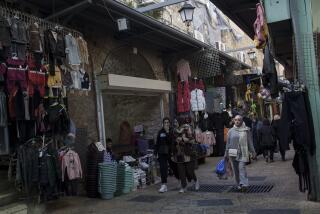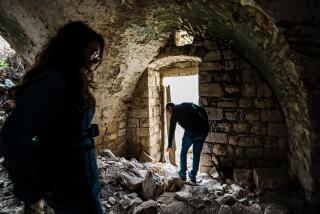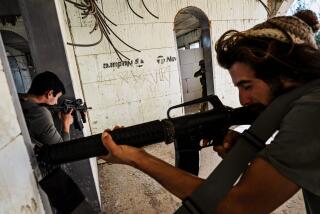Reopened Holy Site a Risky Testing Ground
- Share via
JERUSALEM — The sun beat down on Jerusalem’s ancient walls early Thursday. Finding a bit of shade, about 20 young Israeli men and women stood at the foot of a ramp leading to the city’s most hotly contested holy site.
They heard a few words from their leader, then the women pulled scarves from a bag and put them on their heads. With an armed police escort, they climbed onto the Temple Mount.
Israel has reopened the sacred ground -- known to Muslims as Haram al Sharif, or “noble sanctuary” -- to limited visits by tourists and local Israelis for the first time since rioting nearly three years ago forced a ban on non-Muslim visitors.
Violence at the site following a controversial tour by then-opposition leader Ariel Sharon on Sept. 28, 2000, escalated into the current intifada that Sharon, now prime minister, is struggling to end. Sharon at the time was attempting to assert Israeli claims to all of Jerusalem. Nearly 3,000 Palestinians, Israelis and others have been killed since.
Citing security reasons, Israel restricted access by Palestinian males who were under a certain age or from the West Bank and Gaza Strip. In response, Muslim authorities who control the shrine closed it off to anyone outside that faith.
The timing of Israel’s decision to admit non-Muslims has more than a few people perplexed. Palestinian officials have called it a provocation. Several Israelis who were visiting the nearby Western Wall this week said it was too soon -- the bloodshed between Israelis and Palestinians is still too fresh. “Why wave a red flag?” asked Natasha Pollak, an Israeli doctor and Jerusalem resident.
But Israeli authorities said they were handling the matter gingerly.
“It’s not like this is a grand opening,” said national police spokesman Gil Kleiman. “We are doing this very gradually, very quietly, very delicately.”
Kleiman said small groups who applied for permission were being allowed to enter the hilltop shrine, site of the Al Aqsa mosque -- Islam’s third-holiest site -- and the destroyed biblical Jewish temples. Temple Mount is the holiest place in Judaism.
Israeli sources said authorities had negotiated the gradual reopening with officials from the Islamic Trust, or Waqf, which is in charge of the site.
And although the Waqf denied that it had allowed the visits, it seems unlikely that they’d be happening without at least the trust’s tacit approval.
With Israelis and Palestinians entering a period of fragile negotiations aimed at ending the 33-month-old intifada, the opening of the sacred ground could be a reflection of reduced tension. But it is a risky move. One incident of violence, experts warn, and it could explode anew.
Sharon this week dispatched an envoy to Amman, the Jordanian capital, to explain recent diplomatic developments to King Abdullah II. But the king’s staff instead questioned the Israeli envoy on why the Temple Mount was being opened, diplomatic sources said. Jordan is the custodian of Islam’s holy sites in this part of the world.
“This is a conspiracy started under the pretext of tourism,” an angry Palestinian Authority President Yasser Arafat said this week. “They are extremists who seek to harm al Haram al Sharif.”
The visits had resumed quietly until Israeli television reported them this week. Since then, authorities have sought to downplay them.
On Thursday, Israeli police in the Old City, where the compound is located, insisted that the site remained closed but might open Sunday. A few minutes later, however, the Israeli group was seen moving up the ramp. Some appeared to be members of Israeli security services, though they were not in uniform. They refused to allow a reporter to accompany them.
“I won’t tell you who they are,” the Old City police commander said. “They are not tourists. They are not regular civilians.”
The paramilitary police who guard the ramp leading up to the compound, home also to the golden Dome of the Rock, said both foreigners and Israelis had visited in the last couple of weeks. But, they said, foreign tourists are in short supply these days in the Holy Land, tourism having dropped off precipitously as the violence raged.
At one point, the policemen said, they were ordered by their commander to troll the alleys of the Old City to find tourists who wanted to climb onto the Temple Mount. The idea was to keep up the visits to force the opening of the revered site, they said.
Whatever their complicity in granting access, Waqf officials said they suspected the Israelis would try to use the visits to infiltrate “settlers and Jewish fanatics.”
“The Waqf still insists that visitation for non-Muslims will not resume as long as the Israeli authorities prevent Muslims from the West Bank and Gaza from reaching the mosque for worship,” Waqf Director Adnan Husseini said in an interview.
Some observers believe that tacit permission from the Waqf suggests a lessening of tensions that have roiled Jerusalem and that it comes as part of the larger U.S.-backed diplomatic process known as the “road map.” But the volatility of emotions surrounding the Al Aqsa compound makes it a dangerous testing ground.
“A single act of violence, even a push and shove, at Haram al Sharif or Temple Mount resonates 500 times more strongly on both sides than it would anywhere else,” said writer Gershom Gorenberg, author of “The End of Days: Fundamentalism and the Struggle for the Temple Mount,” a book on religious extremism.
“The potential is very strong for a spark that could light a fire. That’s the nature of the spot. You whisper there, and it’s amplified vastly.”
More to Read
Sign up for Essential California
The most important California stories and recommendations in your inbox every morning.
You may occasionally receive promotional content from the Los Angeles Times.











